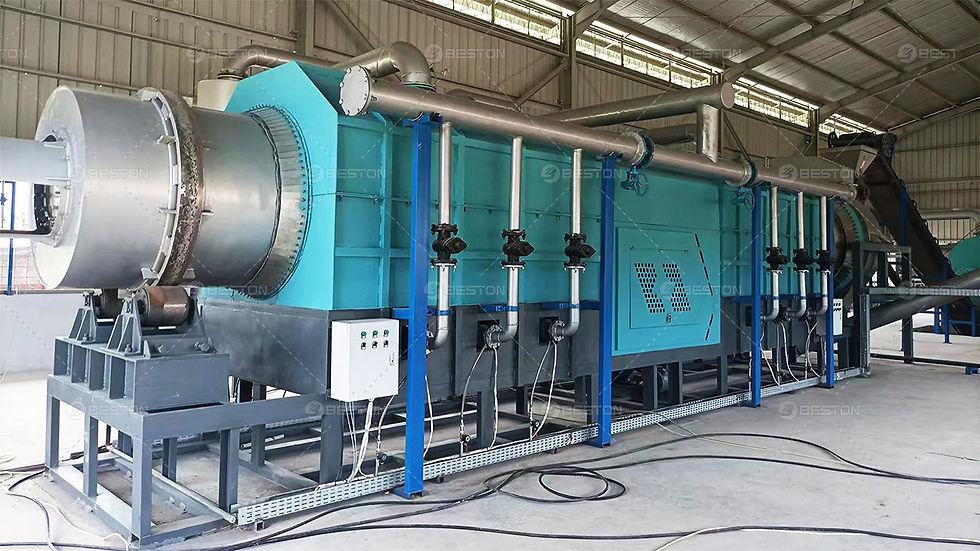Why Coconut Shell is an Excellent Raw Material for Making Charcoal
- june11433
- Jul 22, 2024
- 4 min read
Coconut shell, often regarded as a byproduct of coconut processing, is emerging as an exceptional raw material for charcoal production. The increasing demand for sustainable and high-performance charcoals has highlighted the advantages of using coconut shells as a feedstock. This article explores the intrinsic qualities of coconut shell that make it an ideal candidate for charcoal production, examining its benefits and the role of the coconut shell charcoal making machine in transforming this material into valuable charcoal.
The Advantages of Coconut Shell as a Raw Material
High Carbon Content
One of the primary reasons coconut shell is favored for charcoal production is its high carbon content. The shell’s composition includes a significant proportion of carbon, which is essential for producing high-quality charcoal. Carbon is a crucial element in charcoal because it determines the fuel’s energy density and combustibility. The high carbon content of coconut shells translates into charcoals with superior burning characteristics, making them efficient and long-lasting.
Low Ash Content
Coconut shells have a relatively low ash content compared to other biomass materials. Ash content in charcoal can affect its burning efficiency and create additional waste during combustion. Low ash content is advantageous as it results in cleaner combustion with minimal residue. This property enhances the usability of the charcoal, reducing the need for frequent cleaning and maintenance in applications where cleanliness and efficiency are paramount.
Dense and Hard Structure
The dense and hard nature of coconut shells contributes to the production of high-density charcoal. This physical property is critical as it affects the fuel’s durability and energy output. Charcoals made from coconut shells tend to have a compact structure, which promotes a steady and prolonged burn. The structural integrity of the shell also ensures that the charcoal produced has a consistent quality and performance.
Sustainability and Environmental Benefits
Utilizing coconut shells for charcoal production offers substantial environmental benefits. Coconut shells are a renewable resource and are often considered waste products from coconut processing. By converting these shells into charcoal, valuable resources are efficiently utilized, reducing waste and promoting sustainability. This process contributes to a circular economy, where waste materials are repurposed into high-value products, thus minimizing environmental impact.
The Role of Coconut Shell Charcoal Making Machine
Efficient Pyrolysis Process
The transformation of coconut shells into charcoal involves pyrolysis, a thermochemical decomposition process carried out in the absence of oxygen. The coconut charcoal machine is designed to facilitate this process with precision. It heats the coconut shells to high temperatures, causing them to decompose into charcoal, volatile gases, and byproducts. Modern machines are equipped with advanced controls to optimize the pyrolysis conditions, ensuring high-quality charcoal production and efficient resource use.
Enhanced Control Over Production
Advanced coconut shell charcoal making machines offer precise control over the pyrolysis conditions, such as temperature, pressure, and processing time. This level of control allows for the production of charcoal with specific properties tailored to different applications. For instance, adjustments in temperature can influence the carbon content and density of the charcoal, providing versatility in meeting various market demands.
Improved Energy Efficiency
Coconut shell charcoal making machines are designed to maximize energy efficiency during the production process. Many machines incorporate features such as heat recovery systems and energy-efficient burners, which reduce energy consumption and operational costs. By optimizing the use of energy and minimizing waste, these machines contribute to the overall efficiency and sustainability of the charcoal production process.
Consistent Quality and Scalability
The use of coconut shell charcoal making machines ensures a consistent quality of the produced charcoal. The automation and precision provided by these machines eliminate variability often associated with manual or less controlled methods. Furthermore, the scalability of these machines allows for large-scale production, meeting the demands of both local and international markets efficiently.

Applications of Coconut Shell Charcoal
Fuel for Domestic and Industrial Use
Coconut shell charcoal is used extensively as a fuel in both domestic and industrial applications. Its high carbon content and dense structure make it an effective and long-burning fuel source. In domestic settings, it is used for cooking and heating, while in industrial applications, it serves as a fuel in various manufacturing processes. The efficiency and high energy density of coconut shell charcoal make it a preferred choice in these applications.
Water and Air Purification
The adsorption properties of coconut shell charcoal are highly valued in environmental applications. It is used in water and air purification processes due to its ability to remove contaminants and impurities. The porous structure of the charcoal provides a large surface area for adsorption, making it effective in filtering pollutants and improving the quality of air and water.
Soil Amendment and Fertilizer
In agriculture, coconut shell charcoal is used as a soil amendment and fertilizer. It improves soil structure, enhances water retention, and increases nutrient availability. The addition of biochar, a form of charcoal derived from coconut shells, enriches soil fertility and promotes sustainable agricultural practices.
Activated Charcoal Production
Coconut shell charcoal is also a precursor for producing activated charcoal. Activated charcoal is used in a wide range of applications, including medical treatments, air and water filters, and chemical processes. The high surface area and adsorption capacity of activated charcoal make it a valuable material for these uses.
Conclusion
Coconut shell is an excellent raw material for making charcoal due to its high carbon content, low ash content, dense structure, and environmental benefits. The coconut shell charcoal production plant plays a crucial role in efficiently converting these shells into high-quality charcoal, enhancing production efficiency and quality. The versatility of coconut shell charcoal extends to various applications, including fuel, purification, soil amendment, and activated charcoal production. As the demand for sustainable and high-performance charcoals grows, the utilization of coconut shells represents a valuable and eco-friendly solution in the charcoal industry.




Comments